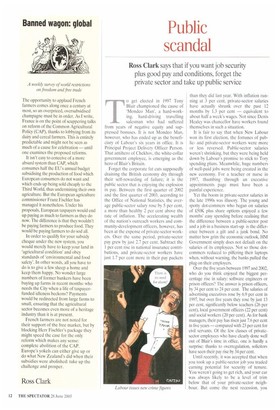Public scandal
Ross Clark says that if you want job security plus good pay and conditions, forget the private sector and take up public service
To get elected in 1997 Tony Blair championed the cause of 'Monde° Man', a hard-working, hard-driving travelling salesman who had suffered from years of negative equity and suppressed bonuses. It is not Mondeo Man, however, who has ended up as the beneficiary of Labour's six years in office. It is Principal Project Delivery Officer Person. That antihero of Chekhov, the white-collar government employee, is emerging as the hero of Blair's Britain.
Forget the corporate fat cats supposedly draining the British economy dry through their self-rewarding of failure; it is the public sector that is enjoying the explosion in pay. Between the first quarter of 2002 and the first quarter of 2003, according to the Office of National Statistics, the average public-sector salary rose by 5 per cent, a more than healthy 2 per cent above the rate of inflation. The accelerating wealth of the nation's outreach workers and community-development officers, however, has been at the expense of private-sector workers. Over the same period, private-sector pay grew by just 2.7 per cent. Subtract the 1 per cent rise in national insurance contributions, and private-sector workers have just 1.7 per cent more in their pay packets than they did last year. With inflation running at 3 per cent, private-sector salaries have actually shrunk over the past 12 months by 1.3 per cent — equivalent to about half a week's wages. Not since Denis Healey was chancellor have workers found themselves in such a situation.
It is fair to say that when New Labour won its first election, the fortunes of publicand private-sector workers were more or less reversed. Public-sector salaries weren't shrinking, but they were being held down by Labour's promise to stick to Tory spending plans. Meanwhile, huge numbers of well-paid jobs were being created in the new economy. For a teacher or nurse in 1997. thumbing through an executive appointments page must have been a painful experience.
Yet the boom in private-sector salaries in the late 1990s was illusory. The young and spotty dot-commers who began on salaries of 150K plus share options enjoyed a few months' easy spending before realising that the difference between a public-sector post and a job in a business start-up is the difference between a gilt and a junk bond. No matter how grim the economic outlook, HM Government simply does not default on the salaries of its employees. Not so those dotcommers reduced to pilfering their laptops when, without warning, the banks pulled the plug on their employers.
Over the five years between 1997 and 2002, who do you think enjoyed the biggest percentage rise in salary: software engineers or prison officers? The answer is prison officers, by 34 per cent to 24 per cent. The salaries of advertising executives rose by 6.9 per cent in 1997, but over five years they rose by just 13 per cent, significantly below teachers (26 per cent), local government officers (22 per cent) and social workers (20 per cent). As for bank managers, their pay has risen just 7.6 per cent in five years — compared with 23 per cent for civil servants. Of the few classes of privatesector employees who have clearly done well out of Blair's time in office, one is hardly a surprise: thanks to overregulation, solicitors have seen their pay rise by 34 per cent.
Until recently, it was accepted that when you took up a public-sector job you traded earning potential for security of tenure. You weren't going to get rich, and your car was always likely to be a level of trim below that of your private-sector neighbour. But come the next recession, you could count on still being able to pay your mortgage. Over the past year, however, the government and public-sector unions appear to have entered into an unwritten agreement that public-sector staff must be paid at least as much as their nearest equivalent in the private sector. Hence local-government functionaries are now called 'chief executive', and, in the case of the City of Bradford, earn £200,000 a year.
It emerges that the five directors of Network Rail, the state-owned 'not for profit' company which replaced Railtrack, have been engaged on the same kind of bonus structure that ministers have attacked in the private sector. The only difference is that in Network Rail's case there are no shareholders to register a protest at the AGM. Instead, it is taxpayers who are left screaming at the prospect that Network Rail's five directors will each pocket more than El million this year if they can hit an unchallenging target: that 82 per cent of trains run on time. In the year before the Hatfield disaster, Railtrack achieved 88 per cent punctuality — and that was by running considerably more trains than Network Rail proposes to allow. When Network Rail's board pockets its millions next year, it will be at the expense of commuters whose trains are being axed in order to speed up the services which remain.
The argument that public-sector salaries need to rise in order to attract and retain talented staff may have been true during the late-1990s boom, but it certainly isn't now. It is the fat pay packets of public-sector jobs which now leap from the pages of the executive appointments supplements. Last week, there were two jobs advertised in the Times 'First Executive' pages offering salaries of more than £120,000. One was UK general manager of an American company making electronic payment systems. The other was executive director for Housing and Social Services for the Borough of Kensington and Chelsea. 'You are passionate about public services,' reads the blurb, 'obsessed with the front line and constantly seeking to drive up standards.' If the job-hunter is really so passionate about being social worker-in-chief for a London borough, why the need for the £120,000 salary plus performance-related pay — twice as much as is offered for the post of senior manager (service delivery and supply management) for the Royal Bank of Scotland? The argument that a social worker could achieve such a high salary by switching to the private sector is absurd; more likely he would end up as an 'outplacement counsellor' at one of the many banks in the process of laying off hundreds of staff.
The borough of Kensington and Chelsea isn't alone in paying booming salaries to its functionaries. Salford City Council is offering £73,000 for a 'head of marketing and communications' — a figure which the subjects of his 'marketing' might do well to remember when they receive their next demand for council tax. Then there is chief executive of the Thanet Community Housing Association, who was hired for £70,000 a year.
Public-sector salaries are not being chased up by competition from privatesector jobs; they are being inflated by the billions that Gordon Brown is pouring into the public sector without a coherent plan as to how it should be spent. Take GPs, who last week voted four to one in favour of a 26 per cent pay rise which will lift their average earnings to £82,000. While it may be true that there is a shortage of GPs, it isn't because they are running away to a more or less static private medical sector; it is because medical-school graduates have been diverted from general practice by the large pay rises to NHS hospital doctors in recent years. As to the government's case that GPs are taking on extra duties in order to qualify for the extra cash, it is spurious, to say the least. Under the new contracts, GPs will be able to opt out of all-night working and of 24-hour responsibility for their patients' health — which has always been one of the cornerstones of general practice — by forfeiting just £6,000 a year in earnings, a mere one third of their pay rise.
One could quote no end of inflated public-sector salaries, but they would only ever tell half the story. Increasingly, public-sector workers are enjoying perks denied to private-sector staff. While tens
of thousands of private-sector employees have seen their final-salary pension schemes discontinued in favour of cheaper and far less remunerative money purchase schemes, public-sector pensions have been largely untouched. In addition, 10,000 public-sector 'keyworkers' in London and the South-east are being showered with interest-free loans of up to 00,000 to buy their own homes. The effect is simply to inflate the lower end of the housing market still further and make it even more difficult for essential private-sector staff to afford housing. Sure enough, it might be difficult for nurses — whose salaries average £22,842 — to afford a home in London. But it is infinitely more difficult for waiters (£ 10,009). sales assistants (£12,156) and plasterers (£16,225). Somehow, the government expects London to function withOut private-sector staff.
In reaction to public horror over corporate greed, the Department of Trade and Industry last year introduced new rules compelling public companies to put their directors' pay packages to a vote at the company AGM. There being no corresponding check on public-sector salaries, from next week, The Spectator will be taking on the task itself. Every issue, we intend to draw attention to an outrageous public-sector salary or a spurious non-job. Outreach workers and skills development co-ordinators, you have been warned.



































































 Previous page
Previous page